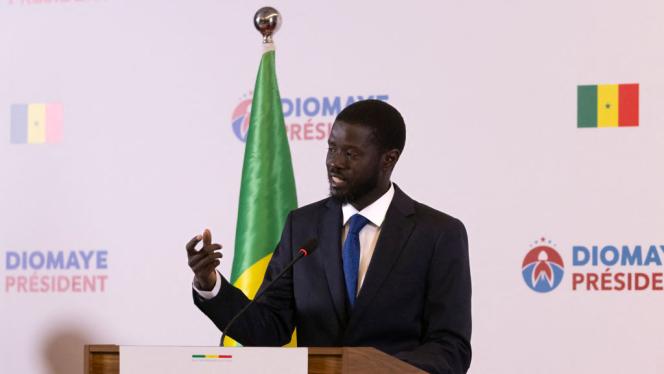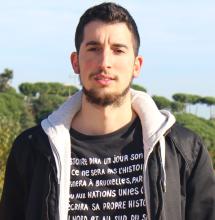Thursday 2 May 2024
Senegal politically reconnects with its past by choosing an outsider as president

Bassirou Diomaye Faye’s election has given renewed hope to the Senegalese public, but will he be able to deliver on their high expectations?
“I was born a fisherman and I want to continue being one,” says a stubborn Makhtar Ndiaye, refusing to give up on his trade, even as the world leaves him alone with only his brother and their fishing boat. He’s from Saint Louis, in northwest Senegal, where the presence of foreign boats has already considerably depleted fish stocks; now, in Ziguinchor, he faces the same problem.
“With this boat, we could go to Spain, it’s powerful enough and has a good engine,” adds his brother, Baka, before rejecting this possibility. They want to continue being what they have always been, and to do so in Senegal. That spirit of resistance, teetering on the edge, is the same spirit shown by hundreds of thousands of Senegalese voters that were finally allowed to cast their ballots on March 24, 2024.
The act of voting itself was a victory against the current government, which postponed the elections from February 25 and initially wanted to hold them in mid-December. Driven by street protests from the youth and a Constitutional Council ruling against President Macky Sall’s postponement decree, the elections proceeded just a month later than planned, marking the first-ever delay in Senegal’s electoral history.
The results represent a break from what had been Senegal’s political life until then. Bassirou Diomaye Faye, chosen as a candidate due to the suspension of popular opposition figure Ousmane Sonko following his imprisonment, has gone from being incarcerated - in his case, awaiting trial - to becoming the fifth president of the republic in a matter of weeks.
From master to pupil
Just as in Senegalese daaras (Qur’anic schools) where teachers pass knowledge to students who can later establish their own schools of thought, Senegalese politics has been governed since independence by such a structure. Leopold Sedar Senghor, the first leader of independent Senegal in 1960, passed power to his successor, Abdou Diouf, to maintain his political line close to France and the International Monetary Fund. The political change in 2000, with the victory of the historic opposition figure Abdoulaye Wade, was seen as a break from the past, but it led, once again, to a reshuffling of political families that would share power. These dynasties, however, can break with the ‘father’ and try to establish new political “lineages.”
After President Wade’s attempt to promote his own son, Karim, Macky Sall broke with him. Sall, who had been prime minister under Abdoulaye Wade, ended up facing him in 2012 in the name of political alternation and transparency. Now he has tried - unsuccessfully - to perpetuate his political line with the election of his successor, Amadou Ba.
In that sense, Faye and Sonko represent a break from a Senegalese political tradition whose main virtue - stability - is also its greatest flaw; the main lines of the structure have not been touched too much since independence. On the last day of this presidential campaign, 97-year-old Abdoulaye Wade himself served his personal revenge against Macky Sall 12 years later, announcing his support and that of his party for the candidacy of Bassirou Diomaye Faye.
Punishment for the dissident
In 1992, Senegalese filmmaker Ousmane Sembène released the film ‘Guelwaar’, fragments of which are still circulating on social media today. One of the main characters, during a food donation from rich countries, decides to rebel against the authorities with a very critical speech. To the astonishment of politicians and spectators, he quotes the 17th-century Wolof philosopher Kocc Barma Fall: “If you want to kill a proud man, give him what he needs to live every day. In the long run, you have made him a serf.” The politicians watching with concern are visibly perturbed and want the embarrassing moment to end as soon as possible. One asks for explanations, and quickly one of his assistants reassures him: “He has spoken in public for the last time.”
Thirty years after the film, Senegal remains dependent on food imports - 60% of rice is imported - and is considerably indebted. Senegal has periodically faced rebellious characters taking the government to task over the prevailing economic system, based on peanut cultivation and closeness to Western investors - especially the French. The most common responses have been imprisonment, exile, or death, as opposition leaders and hundreds of young people who spent months in jail without charge have recently experienced.
In that regard, both Ousmane Sonko and the president-elect Bassirou Diomaye Faye are attempting to break new ground where others found previously found stone.
The other path of independence: socialism with Senegalese characteristics
Senegal’s political independence from France, achieved in 1960, had a considerable paradox: the country’s first president, the poet Leopold Sedar Senghor, had not even been in favour of independence a few years earlier. Politically astute, Senghor managed to overcome being from a minority group - the Serer - and being Catholic, the religion of less than 10% of Senegalese to rise to the top of the country’s political echelon. Able to capture former trade unionists and religious leaders - the two true mass organisations in colonial Senegal - Senghor set himself the task of ridding the country of political actors who wanted to exercise their country’s sovereignty in order to economically transform it.
Mamadou Dia, Senghor’s prime minister, was the most prominent member of this faction. If Senghor wanted to follow a line closer to Paris, Dia wanted to build African socialism through agricultural cooperatives. By eliminating the role of intermediaries - usually Muslim religious leaders or Lebanese traders - Dia wanted to liberate the forces of the inland peasants, who were usually borrowing credits at high interest rates through the intermediaries. Ideologically distant from both the west and the Soviet Union, Dia believed that African socialism should be built on humanistic foundations that could align with both the Christian and Muslim beliefs of Senegalese people. Accused of attempting a coup in 1962 after a power struggle with Senghor, Dia was eventually sentenced to life imprisonment in Kédougou, over 900km from the Senegalese capital, Dakar.
Muslim leaders preferred to support the Catholic Senghor and the French Chamber of Commerce to preserve businesses and the influential role they had accumulated during colonial times. A presidential pardon allowed Dia to leave prison after twelve years, but by then his political capital had dried up: considered a moral beacon until his death, he never managed to turn that clout into votes.
Islamic values for an anti-corruption uprising
In Senegal, the state is secular, and religion is separated from the state, but religious institutions like Islamic brotherhoods are key to understanding the country’s history. In moments of crisis, uprisings, or strikes, they have pulled strings to restore peace—usually in favour of the interests of the political and economic establishment. Both the entourage and the followers of Ousmane Sonko emphasise, among his main qualities, his condition as a believer who governs his life according to the values of Islam.
Founder of the Pastef party, whose initials appeal to ‘work, ethics, and fraternity,’ Sonko demonstrated this commitment when he risked his position as a tax inspector by denouncing government corruption in the distribution of oil exploitation licences. He lost his job, but in return gained the respect of thousands of young people, who came to consider him a morally credible political leader.
His party’s political program, after a period of some ideological ambiguity, has ended up defining itself as close to “left-wing Pan-Africanism,” with proposals for renegotiation of resource exploitation contracts—gold, gas, and oil—and an open debate on the use of the CFA franc, the currency used in Senegal from colonial times. His more nationalist speeches, where he appeals to the welfare of Senegalese people and launches fiery criticism of economic institutions designed to safeguard the interests of foreign investors, have earned him the support of the younger population in a country with an average age of 19 years.
In Ziguinchor, where both his family and his most loyal followers live, thousands of people cling—almost dogmatically—to the leadership of a man whose main asset is that he has “never let them down” and that he “fears God,” unlike the current political elite—whom they consider corrupt and detached from the interests of the average Senegalese. Following Sunday’s victory, the new president, Bassirou Diomaye Faye, elected by Sonko and now by the Senegalese people, will have to face the interests—both internal and external—that have benefited from the status quo that has governed Senegal for decades.
With debt repayments looming—they will have to pay $3 billion in 2026, 10% of Senegal’s GDP. Faye will also have to manage the high expectations he’s given to the public on the campaign trail. The scenes of jubilation across the streets of Senegal showed that large parts of the public feel that his election means they’ve got their guy into the driving seat. With the clock ticking, the important question is whether he can deliver.






